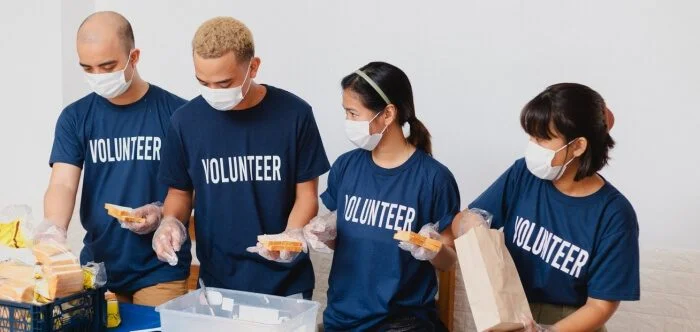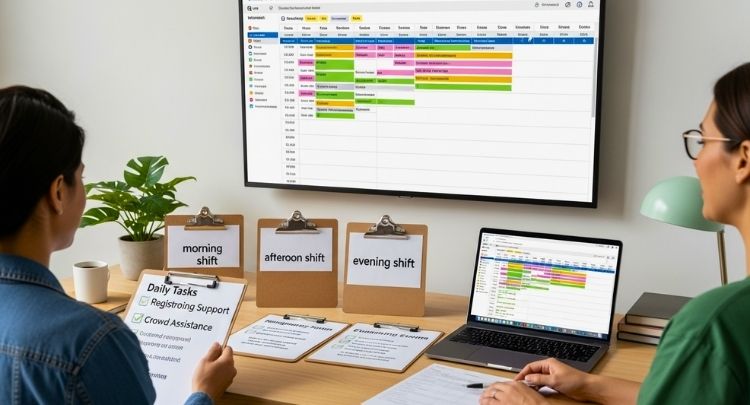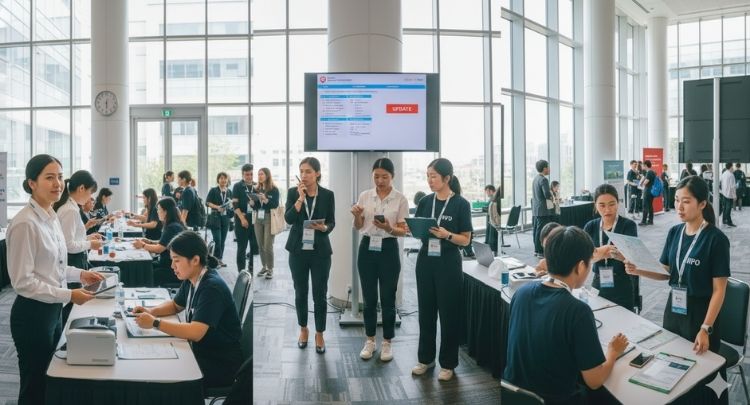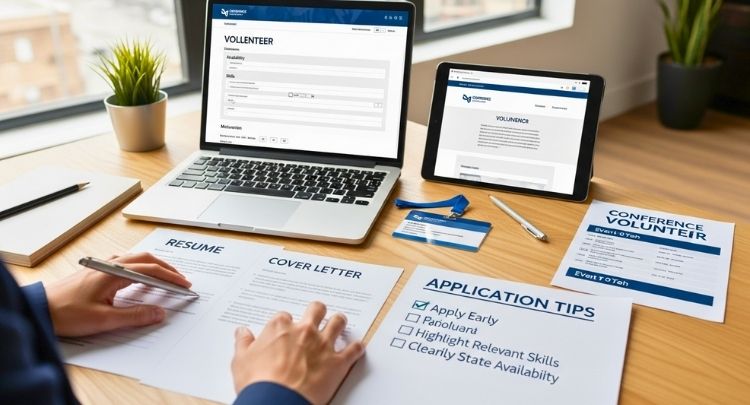A conference volunteer helps make events run smoothly by offering support before, during, and after the sessions. These volunteers assist organizers, guide guests, and provide important help. They play a key role in creating a welcoming and organized event for everyone.
Volunteers gain experience, build skills, and connect with professionals. If you’re wondering what does a volunteer do at a conference, the answer is quite simple.
Volunteers welcome guests, manage registration, assist with speaker sessions, guide participants, and help with technical or logistics tasks. They follow assigned schedules, attend short training sessions, and make sure everything goes as planned for a successful conference.
Keep reading to learn the full list of volunteer tasks and duties. Discover what to expect from your volunteer role. Find tips to enjoy and succeed as a conference volunteer.
Conference Volunteer at a Glance (Who are they)
Conference volunteers are individuals who support event organizers by assisting with day-to-day operations before, during, and sometimes after a conference. They often include students, early-career professionals, or industry enthusiasts who want hands-on exposure to professional events.
Typical responsibilities
Common tasks include attendee check-in, greeting guests, guiding participants to sessions, assisting speakers, supporting registration desks, helping with technical or virtual sessions, and managing basic logistics.
Time commitment
Most conferences require volunteers to work in shifts, usually ranging from 4 to 6 hours per day. Multi-day events may rotate roles to balance workload and prevent fatigue.
Skills required
Strong communication, reliability, teamwork, problem-solving, and basic time management skills are essential. Technical skills may be helpful for hybrid or virtual events.
Training provided
Many organizers offer short orientations or briefings covering roles, schedules, venue layout, communication tools, and emergency procedures before the event begins.
Common perks
Volunteers often receive free or discounted access to sessions, meals during shifts, certificates of participation, networking opportunities, and sometimes recommendation letters.
Suitable for
This role suits people seeking experience, networking, or career exposure at professional events hosted in major destinations such as conferences in Canada, the United States, the United Kingdom, Germany, and Australia.
What Does a Volunteer Do at a Conference: Core Responsibilities of a Conference Volunteer
Conference volunteers help events run without problems. They support guests, speakers, and organizers during the event. Their work makes the conference friendly, safe, and well organized. Here are common responsibilities of a conference volunteer:
Attendee Support Roles
- Volunteers welcome guests at entrances and help them feel comfortable when they arrive. They answer simple questions and guide people in the right direction.
- They help at registration desks by checking names, scanning badges, and handing out materials. This keeps lines short and helps people enter quickly.
- Volunteers guide attendees around the venue and point out rooms, halls, and facilities. Clear directions reduce confusion and crowding.
Session & Speaker Support
- Volunteers support speakers by greeting them and showing them where to go. They stay nearby in case speakers need quick help.
- Room hosts stay inside session rooms to make sure everything looks ready. They help attendees find seats and keep sessions calm.
- Timekeepers watch the clock and help manage microphones during talks. This keeps sessions running on schedule.
Operations & Logistics
- Volunteers help set up chairs, signs, tables, and materials before sessions start. Early setup keeps the venue neat and safe.
- Floater volunteers move between areas to help wherever needed. They solve small problems quickly when plans change.
- Volunteers assist sponsors and exhibitors by giving directions and basic support. This helps sponsors connect with attendees easily.
Pre-Event Setup Work
Many volunteers start work one or two days before the conference begins. This includes:
- Stuffing hundreds of swag bags with brochures and gifts
- Sorting and assembling name badges and lanyards
- Packing welcome kits and schedules
- Setting up registration tables and signage
Technical & Digital Support
- Some volunteers help with screens, slides, microphones, and simple sound issues. Quick fixes prevent delays during sessions.
- Volunteers assist attendees with event apps, digital tickets, or schedules. This helps people stay informed during the event.
- At online or hybrid events, volunteers manage chat rooms and questions. They help remote attendees feel included.
Skills Needed to Be a Successful Conference Volunteer
Volunteering at a conference feels exciting, fast, and sometimes a little confusing at first. Many people think the role looks simple, but it needs several useful skills. These skills help you work better with others and handle tasks smoothly. Learning them early makes volunteering easier and more enjoyable. Here are the required skills to be a successful conference volunteerL
Communication
Good communication helps you talk clearly with attendees, speakers, and other volunteers during busy moments. You should explain directions simply, listen carefully to questions, and answer politely even when people seem rushed. Clear talking avoids confusion and helps everyone feel comfortable. When you speak with confidence and kindness, people trust your help and follow instructions more easily.
Teamwork
Conference volunteering is never a solo job because many people work together at the same time. You may share tasks, help others finish work, or step in when someone needs support. Working well in a team means respecting different opinions and staying helpful. When everyone supports each other, the event feels calmer and more organized.
Problem Solving
Small problems happen often at conferences, like lost badges or wrong room directions. A good volunteer stays calm, thinks quickly, and looks for simple solutions. You do not need perfect answers, just a helpful attitude. Asking the right person for help and acting fast can solve most issues without stress.
Time Control
Managing time helps you stay on track with tasks and shifts during the event. You must arrive on time, follow schedules, and finish duties without delay. When volunteers respect time, sessions start smoothly and guests stay happy. Good time habits also reduce pressure during busy hours.
Staying Calm
Busy crowds, noise, and questions can feel overwhelming during large conferences. Staying calm helps you think clearly and respond in a friendly way. When you keep your cool, others feel relaxed too. Calm behavior helps avoid mistakes and keeps situations under control.
Being Responsible
Reliability means showing up as promised and taking your role seriously. Organizers trust volunteers who follow rules and act professionally. Simple actions like wearing badges properly and respecting instructions matter a lot. When you act responsibly, people depend on you with confidence.
Specialized Volunteer Roles at Modern Conferences
Modern conferences often use volunteers for more focused roles, not just general help. These roles support specific parts of the event and need extra care or attention. Each role helps the conference feel professional, welcoming, and well managed. Below are some common specialized volunteer roles you may see today.
Floater / Runner
A floater or runner moves around the venue and helps wherever support is needed at that moment. They may deliver messages, bring supplies, guide staff, or solve small issues quickly. This role suits people who stay alert and flexible because tasks change often. Organizers depend on runners when plans shift or urgent help is required.
VIP or Keynote Escort
This volunteer supports special guests like keynote speakers or VIP attendees. They greet them, guide them through the venue, and make sure they reach sessions on time. The role needs politeness, confidence, and good communication. A calm escort helps important guests feel respected and comfortable during the event.
Sponsor Liaison
Sponsor liaison volunteers help sponsors and exhibitors during the conference. They answer basic questions, guide visitors to booths, and report issues to organizers. This role helps sponsors interact smoothly with attendees. Friendly behavior and clear communication make sponsors feel valued and supported.
Social Media or Live-Content Volunteer
This role focuses on sharing conference moments online through photos, short videos, or posts. Volunteers may help capture sessions, crowd moments, or announcements. They work closely with organizers to share correct information. The role suits people who enjoy content creation and quick updates.
Photographer / Videographer
These volunteers capture photos and videos of sessions, speakers, and audience interactions. Their work helps promote future events and record important moments. Attention to timing and angles matters in this role. Clear coordination with organizers ensures important highlights are not missed.
Accessibility & Inclusion Support
Accessibility volunteers help attendees with special needs feel comfortable and included. They guide people to accessible seating, help with directions, or share support information. This role needs patience, respect, and awareness. Their help makes the event welcoming for everyone.
Sustainability / Green-Event Volunteer
Green-event volunteers support eco-friendly practices during the conference. They guide waste sorting, reduce paper use, and promote recycling efforts. This role helps lower environmental impact. Volunteers in this role encourage small actions that make the event more responsible.
Volunteer Shift Scheduling & Daily Workflow
Conference volunteering follows a simple daily plan so everyone knows what to do and when to do it. Organizers plan shifts carefully to avoid confusion and stress. Clear schedules help volunteers stay confident and prepared. This system keeps the event running smoothly from start to finish.
Ways Shifts are Assigned
Organizers usually assign shifts before the event based on availability and preferred roles. Volunteers may choose time slots during signup, which helps match people with suitable tasks. Clear shift details are shared early so volunteers can plan their day properly. This method avoids last-minute confusion and keeps everyone informed.
Typical Shift Length
Most volunteer shifts last between four and six hours, depending on the event size. Shorter shifts help volunteers stay active without feeling tired too quickly. For multi-day conferences, volunteers may work only one shift per day. This balance keeps energy levels steady and work quality high.
Physical Demands You Should Expect
Conference volunteering is active work. You will often stand or walk for long hours, sometimes covering thousands of steps in one day. Registration desks, room support, and guiding guests require being on your feet most of the time. Experienced volunteers always recommend wearing comfortable sneakers or walking shoes instead of formal footwear.
Breaks and Role Rotation
Organizers include breaks so volunteers can rest, eat, and recharge during busy days. Some events also rotate roles to avoid boredom or physical strain. Changing tasks helps volunteers stay focused and learn new skills. Regular breaks make long events easier to manage.
Backup Volunteers and Coverage
Many conferences keep extra volunteers ready in case someone is absent or an area gets too busy. Backup support helps solve problems quickly without stress. Volunteers can step in to cover short gaps or emergencies. This planning keeps the workflow steady even when plans change.
Preventing Volunteer Burnout
Organizers prevent burnout by limiting shift hours and checking on volunteers regularly. Clear instructions reduce pressure and confusion during tasks. Friendly teamwork and support make volunteers feel valued. When people feel respected and rested, they perform better and enjoy the experience.
Training, Orientation & Communication
Good training and clear communication help volunteers feel confident before the conference starts. Organizers plan simple steps so everyone understands their role clearly. This preparation reduces mistakes and stress during busy moments. When volunteers feel informed, they perform better and enjoy the work more.
Pre-Event Briefings
Before the conference begins, organizers usually hold a short briefing for all volunteers. During this time, they explain the event schedule, main areas, and general expectations. Volunteers can ask questions and understand how the day will flow. These briefings help everyone start with the same information and confidence.
Role-Specific Instructions
Each volunteer role comes with clear instructions related to assigned tasks. Organizers explain what to do, where to stand, and who to contact for help. This guidance helps volunteers avoid confusion during work. Knowing exact duties makes tasks easier and faster to complete.
Communication Tools
Conferences often use simple tools like WhatsApp groups, Slack channels, or walkie-talkie radios. These tools help volunteers stay connected with team leaders and organizers. Quick messages allow fast updates or problem reporting. Good communication tools keep everyone informed during busy hours.
Emergency Procedures
Volunteers receive basic information about emergency exits and safety steps. Organizers explain whom to contact if something goes wrong. Volunteers do not manage emergencies but help guide people calmly. This knowledge helps keep everyone safe and organized.
Review Before the Event
Volunteers should review schedules, venue maps, dress guidelines, and contact lists before arriving. Reading instructions early avoids confusion on the event day. Being prepared helps volunteers stay relaxed and focused. Preparation makes the whole experience smoother.
Do Conference Volunteers Get Paid? (Perks & Incentives)
Many people wonder whether conference volunteers earn money for their time and effort. In most cases, volunteering at a conference is unpaid, especially for academic, nonprofit, or community events. Instead of salary, organizers offer other rewards that make the experience valuable. Understanding this helps volunteers set clear expectations before signing up.
In unpaid volunteering, people give their time to support the event and gain experience. This is common at conferences focused on learning, research, or professional growth. Paid volunteering is rare and usually limited to large commercial events or short-term operational roles. Even then, payment may depend on hours worked or specific responsibilities.
Although money is not always involved, volunteers often receive useful perks in return. Many conferences offer free or discounted access to sessions, allowing volunteers to attend talks when they are off duty. Meals and refreshments during shifts are common, helping volunteers stay comfortable throughout the day. These small benefits reduce personal costs while working at the event.
Volunteers may also receive certificates, thank-you letters, or recommendation letters after the conference ends. These documents help when applying for future roles, internships, or academic opportunities. For many people, the benefits of volunteering at a conference also include meeting professionals, speakers, and organizers who can share advice or opportunities. These connections can be helpful later in education or career planning.
In some situations, conferences provide limited stipends or reimbursements. This may cover travel, local transport, or basic accommodation, especially for student volunteers. Such support depends on the event budget and volunteer role. Organizers usually explain these details clearly before the event begins.
How to Network as a Conference Volunteer?
Volunteering gives you a natural reason to talk to people.
Here is how to use it well:
- When guiding a speaker, introduce yourself politely
- Ask simple questions about their work
- Mention you are helping at the event
- Connect on LinkedIn after the session
Because you work inside the event, you meet speakers, sponsors, and organizers more easily than regular attendees.
How Volunteer Duties Change by Conference Type?
Volunteer duties at conferences vary significantly by event type, with academic and medical gatherings often emphasizing session support and attendee guidance, while business and tech events focus more on registration, logistics, and interactive tech demos.
Academic Conferences
Volunteers handle on-site tasks like registration checks, guiding delegates to sessions, and assisting with poster areas or hybrid setups. They commit to substantial time, such as 50% of conference days or six-plus hours, often earning free entry in return. Duties prioritize smooth academic flow over sales or networking.
Business Conferences
Roles center on attendee greetings, packet distribution, concierge services for session info, and networking support during two-hour shifts. Corporate-style events may include team-building facilitation or sponsor coordination, blending operational help with professional mingling. These duties suit quick interactions in high-attendance settings.
Tech Conferences
Volunteers manage check-ins, troubleshoot attendee queries, and support workshops like AR/VR demos or coding challenges, requiring computer literacy and crowd calm. They staff stages, scan sessions, or aid logistics, gaining exposure to innovations while ensuring event efficiency. Tech roles often demand standing and positive problem-solving amid busy crowds.
Medical/Health Conferences
Tasks involve access control, exhibitor setup, room assembly, resource table staffing, and breakout monitoring, with some needing healthcare knowledge. Volunteers assist speakers and media while providing meals during shifts, focusing on public health flow for thousands of delegates. Commitments emphasize reliability in specialized environments.
Common Challenges & How Volunteers Handle Them
Conference volunteering can feel exciting, but it also comes with a few challenges. Busy schedules, many people, and unexpected situations can test patience. These moments help volunteers learn quickly and grow more confident. Knowing common challenges makes handling them much easier. Here are the common challenges and how you can handle them:
Difficult Attendees
Some guests may act upset, tired, or confused, and this can happen for many reasons. When this happens, it is important to stay calm and not take their words in a personal way. You should listen to them with care and speak in a polite tone so they feel heard. If there was a problem, say sorry for the trouble and try to help fix it. If the issue is too big or you cannot solve it, then it is best to call a supervisor or team leader so they can handle it in the right way.
Technical Issues
Small technical problems like microphone failures or slide errors can happen anytime. Volunteers stay alert and report issues immediately to the tech team. They help speakers stay calm while fixes happen. Quick action reduces delays and avoids confusion.
Long Hours or Standing Time
Volunteers may stand or move around for long periods during the day. Taking short breaks, drinking water, and stretching helps manage tiredness. Organizers usually rotate roles to reduce strain. Good planning keeps energy levels steady.
Making Mistakes
Mistakes can happen, especially for first-time volunteers. The best response is to stay calm, correct the issue, and ask for help if needed. Learning from errors builds confidence. Organizers expect small mistakes and focus on solutions.
Unexpected Emergencies
Unexpected events like health issues or crowd problems may arise. Volunteers follow instructions and guide people calmly when needed. They report emergencies instead of trying to manage them alone. Clear communication keeps everyone safe.
Volunteer Code of Conduct, Safety & Responsibility
Conference volunteers follow simple rules that help events stay safe, fair, and organized. These guidelines explain how volunteers should act, protect people, and respect limits. Understanding these points helps volunteers feel confident while supporting others responsibly.
Professional Behavior Standards
Volunteers act politely, follow instructions, and dress appropriately while representing the event at all times. Respectful language, calm actions, and teamwork help create a positive atmosphere for attendees, speakers, and staff.
Confidentiality Expectations
Volunteers may see private details like schedules, contact lists, or speaker information during their duties. They must keep this information private and avoid sharing details casually, online, or with people outside the event.
Accessibility Awareness
Volunteers stay aware of different attendee needs, including mobility, hearing, or vision support. Helping people find accessible seating, entrances, or assistance areas ensures everyone feels included, comfortable, and respected.
Health and Safety Basics
Basic safety knowledge helps volunteers respond wisely during busy or unexpected moments. Understanding exits, reporting issues quickly, and following instructions matters more than personal action, especially when discussing volunteer compensation at conferences during briefings.
Liability and Responsibility Boundaries
Volunteers support tasks within assigned roles and avoid actions beyond their training. Reporting problems to supervisors protects everyone involved and keeps responsibility clear during challenging situations.
Real-World Example: A Day in the Life of a Conference Volunteer
At a large business conference, a student volunteer arrives early in the morning for their assigned shift. The venue feels busy, with staff preparing rooms and attendees lining up outside. The volunteer checks the schedule, wears the badge, and waits for instructions from the team lead.
Role Performed
“The volunteer works as a registration and room-support helper throughout the day. They scan badges, guide guests to session rooms, and help speakers find the correct halls. During breaks, they answer simple questions and direct people to rest areas or help desks.”
Challenges Faced
“The busiest moment comes during morning check-in when long lines start forming. A scanner stops working, and some attendees feel impatient. The volunteer stays calm, informs the supervisor, and helps redirect people to another desk to reduce waiting time.”
Skills Gained and Outcomes
“By the end of the day, the volunteer feels more confident speaking with strangers and handling pressure. They learn teamwork, clear communication, and time control through real tasks. The experience ends with a thank-you note and new professional connections.”
Tips for Applying as a Conference Volunteer
Applying as a conference volunteer feels exciting but confusing when you start searching opportunities online. Tips help you prepare documents, understand expectations, and improve selection chances. Simple steps save time, reduce stress, and help you feel ready on event day. Here they are:
- Research Events Early: Check event pages early and read volunteer details carefully to understand roles, timing, and basic expectations clearly. Early review helps you choose suitable shifts and avoids confusion during busy registration or session periods times.
- Be Honest Always: Complete the application honestly and highlight skills like communication, reliability, or technical comfort when asked by organizers. Clear answers help organizers place you in roles where you can perform confidently and learn effectively quickly.
- Confirm Availability First: Confirm availability before applying so you can attend required shifts without last minute problems or schedule conflicts. Reliable availability builds trust and increases chances of being selected for future events with organizers and teams.
- Prepare Documents Early: Prepare documents early such as identification, confirmation emails, or consent forms requested by organizers before event days. Having materials ready saves time on arrival and reduces stress during check in process for volunteers greatly.
- Ask Questions Clearly: Ask questions politely if instructions seem unclear so you understand duties before the conference begins fully starts. Good questions show interest and help you perform tasks correctly from the first shift with confidence always.
Frequently Asked Questions
Conference volunteering often raises practical questions for people considering this role. Many details go beyond basic duties and skills. These FAQs address common concerns that first-time volunteers usually want clarified.
What Is The Main Purpose of Conference Volunteers?
Conference volunteers help organizers manage event flow and attendee experience smoothly. They support daily operations, assist guests and speakers, and reduce workload for staff. Their presence allows sessions, registration, and logistics to run on time without unnecessary delays.
Do Volunteers Work Before And After The Conference?
Some volunteers assist before the conference starts by helping with setup, materials, or preparation tasks. Others may help after sessions end with cleanup or wrap-up duties. This depends on event size, role type, and organizer needs.
Can Volunteers Attend Conference Sessions?
Many conferences allow volunteers to attend sessions during free time or outside assigned shifts. Access rules depend on schedules and event policies. Volunteers often enjoy learning opportunities while balancing duties responsibly throughout the conference day.
Are Conference Volunteers Required To Wear Uniforms Or Badges?
Most conferences provide badges, t-shirts, or wristbands to identify volunteers easily. These items help attendees recognize helpers quickly. Wearing official identification also allows volunteers access to restricted areas needed for their assigned tasks.
How Are Volunteers Supervised During The Event?
Volunteers usually report to a team leader or volunteer coordinator during the conference. Supervisors assign tasks, answer questions, and solve issues. Clear supervision ensures volunteers feel supported and understand whom to contact when problems arise.
Can Volunteering Lead To Future Opportunities?
Volunteering can open doors to future events, internships, or part-time roles. Organizers often remember reliable volunteers and may invite them again. Positive performance builds trust and strengthens connections within the event or professional community.
Do Volunteers Need Prior Event Experience?
Most conferences welcome volunteers without prior experience, especially for entry-level roles. Organizers provide instructions and guidance to help new volunteers succeed. A positive attitude and willingness to learn matter more than previous event involvement.
What Happens If A Volunteer Cannot Complete A Shift?
If a volunteer faces an issue, they should inform the coordinator as soon as possible. Organizers may adjust schedules or assign backups. Clear communication helps avoid disruption and keeps the event running smoothly.
Final Thoughts
Applying to volunteer at a conference needs care and honesty from the start. You should fill out the application with correct details, clear availability, and true skills to avoid confusion later. If you notice a mistake, contact the organizer quickly and explain the issue clearly. Small errors may cause role changes, missed shifts, or loss of trust.
Bigger mistakes can even remove you from the volunteer list. Understanding what does a volunteer do at a conference helps you choose the right role and answer questions correctly. Careful steps, clear words, and quick fixes protect your chances and build strong trust with organizers.











